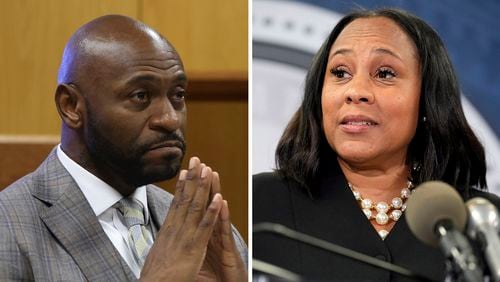Defense attorneys in January sought to disqualify District Attorney Fani Willis and her entire staff from prosecuting the Fulton County election interference case. They said Willis had an improper romantic relationship with the man she hired to oversee the case, special prosecutor Nathan Wade, and benefitted financially from the arrangement.
More recently, they have sought to show that Willis and Wade lied under oath about when their relationship began.
Numerous court filings and hearings later, here’s what we’ve learned about the key allegations.
Allegation: Willis and special prosecutor Nathan Wade have been engaged in a “romantic relationship.”
What we know: In court documents and testimony, Willis and Wade acknowledge they were romantically involved. They say the romance ended last summer, but they remain friends.
Allegation: Willis and Wade were already in a romantic relationship when she hired him to oversee the election case in November 2021.
What we know: The timing of the romance has become a key issue, and it’s still in dispute. Willis and Wade insisted their romance began in early 2022 – months after she hired him.
Robin Bryant Yeartie, a former friend and employee of Willis, testified the DA told her she was romantically involved with Wade before she hired him. Yeartie said she saw them hug and kiss in late 2019, not long after they met at a judicial conference.
Wade’s former partner and divorce lawyer, Terrence Bradley, texted defense attorney Ashleigh Merchant in early January that the romance “absolutely” began before Willis hired Wade. But he testified under oath that he did not know when the romance began and said he was only speculating about the relationship when he communicated with Merchant.
Defense attorneys also cited Wade’s cell phone records, which they said contradict Willis’ and Wade’s accounts of their relationship. An analysis of the records showed Wade visited the neighborhood near Willis’ Hapeville condo at least 35 times before the DA hired him. On two occasions he arrived late at night and left early in the morning.
Willis and Wade said he only occasionally visited her at her the condo and never spent the night. They say the cell phone records don’t confirm Wade was visiting Willis, and she was away at work during some of the times
Fulton County Superior Court Judge Scott McAfee must still decide whether to submit the cell phone records into evidence.
Allegation: Wade and Willis profited from the prosecution of the case at the expense of taxpayers. Wade purchased plane tickets and hotels rooms for trips with Willis using money he earned from the case.
What we know: Willis and Wade said they divided the cost of travel roughly evenly between them – sometimes he paid, sometimes she paid. Willis said she sometimes reimbursed Wade in cash. At other times, she said she paid for activities such as wine tastings on their trips.
Wade said he had no financial interest in the outcome of the prosecution, no funds paid to him for his work have been shared with Willis and she received no funds or personal gain from his position as special prosecutor.
Wade also said they had “never cohabitated,” he has “never shared household expenses” with Willis and has “never shared a joint financial account of any kind” with her.
Defense attorneys have cast doubt on Willis’ and Wade’s accounts of their finances – for example, they noted they cannot document the cash reimbursements.
But they have not conclusively demonstrated that Willis benefitted financially from the case.
Allegation: Although not included in the initial motion seeking to disqualify Willis, defense lawyers have tried to show in recent weeks that Wade and Willis lied under oath about when their relationship began.
What we know: Wade submitted a sworn affidavit to the court on Feb. 2 which said his relationship with Willis became romantic in early 2022. In a court filing on the same day, the DA’s office made the same claim. Wade and Willis both stuck to that timeline when they testified under oath on Feb. 15.
While defense lawyers have tried to poke holes in that testimony — using cell phone records and text messages and testimony from two witnesses — it’s unclear if they succeeded.
Allegation: Willis violated county contracting and ethics laws by hiring Wade and failing to disclose their relationship and the trips he paid for.
What we know: Willis said her appointment of Wade violated no state our county contacting procedures. As a state constitutional officer, Willis said she has the authority to execute contracts with her office.
Willis said she is not required to follow county contracting procedures because she is a state constitutional officer. But she said she went beyond what was required by ensuring Wade’s invoices were reviewed and approved by the county’s chief financial officer - “hardly a process one would undertake if concealing a scheme to funnel ill-gotten funds outside the prying eyes of county officials.”
McAfee has not considered these allegations. But the Fulton County Board of Ethics will meet March 7 to consider two complaints against Willis. One contests the way she handled Wade’s contract and her acceptance of the trips as “gifts.” The other says she illegally refused to release certain records concerning Wade’s invoices.
Allegation: The actions of Willis and Wade have “created a fatal and irreparable defect in the indictment against Mr. Roman and a conflict of interest that has tainted the entire prosecution.”
What we know: Willis said her relationship with Wade does not pose a conflict of interest under state law. She cited relationships between two sets of defense attorneys on the case that would also merit their disqualification, if they were held to the same standard.
“Conflict arises when a prosecutor has a personal interest or stake in a defendant’s conviction - a charge that no defendant offers any support for beyond fantastical theories and rank speculation,” Willis wrote in a court filing.
Ultimately, it will be up to McAfee to determine whether the Willis-Wade relationship poses a conflict of interest. He will hear each side’s final arguments at a hearing Friday.
About the Author








